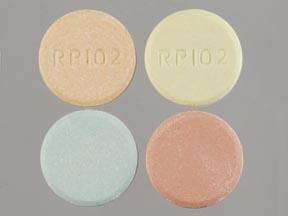Calcium Carbonate Dosage
Medically reviewed by Drugs.com. Last updated on Jul 22, 2025.
Applies to the following strengths: 650 mg; 600 mg; 1250 mg/5 mL; 1250 mg; 1000 mg; 500 mg; 400 mg; base 500 mg; 750 mg; 900 mg; 1177 mg; 648 mg; 420 mg; 250 mg; 550 mg; 850 mg; 400 mg/5 mL; 350 mg; 1.5 g; 1 g; 300 mg; 450 mg
Usual Adult Dose for:
Usual Pediatric Dose for:
Additional dosage information:
Usual Adult Dose for Hypocalcemia
Recommended dose: 1250 mg orally 2 to 3 times a day with meals
Use: Prevention of calcium deficiency
Usual Adult Dose for Dyspepsia
Chewable Tablets:
- Recommended dose: 1000 to 3531 mg orally up to 4 times a day as needed
- Maximum dose: 6750 to 7500 mg/day
- Duration of therapy: Up to 2 weeks
Gum:
Recommended dose: 500 mg (1 piece) orally every 2 to 4 hours as needed
Maximum dose: 6000 mg/day (12 pieces/day)
Duration of therapy: Up to 2 weeks
Liquid:
Recommended dose: 1250 mg orally as needed for symptoms
Maximum dose: 7500 mg/day
Duration of therapy: Up to 2 weeks
Powder Packets:
Recommended dose: 1000 mg (1 packet) orally as needed for symptoms
Maximum dose: 8000 mg/day (8 packets/day)
Duration of therapy: Up to 2 week
Comment:
- This drug should only be used for 2 weeks except under the supervision of a healthcare provider.
Use: Relief of upset stomach due to heartburn, acid indigestion, and/or sour stomach
Usual Pediatric Dose for Dyspepsia
Chewable Tablets:
2 to 5 years OR 24 to 47 pounds:
- Recommended dose: 400 mg orally up to 3 times a day as needed
- Maximum dose: 1200 mg/day
- Duration of therapy: Up to 2 weeks
6 to 11 years OR 48 to 95 pounds:
- Recommended dose: 800 mg orally up to 3 times a day as needed
- Maximum dose: 2400 mg/day
- Duration of therapy: Up to 2 weeks
12 years and older:
- Recommended dose: 1000 to 2000 mg orally up to 3 times a day as needed
- Maximum dose: 7500 mg/day
- Duration of therapy: Up to 2 weeks
Granule Formulations:
2 to 5 years OR 24 to 47 pounds:
- Recommended dose: 375 mg orally up to 2 times a day as needed
6 to 11 years OR 48 to 95 pounds:
- Recommended dose :750 mg orally once a day as needed
- Duration of therapy: Up to 2 weeks
Gum:
12 years and older:
- Recommended dose: 500 mg (1 piece) orally every 2 to 4 hours as needed
- Maximum dose: 6000 mg/day (12 pieces/day)
- Duration of therapy: Up to 2 weeks
Comments:
- Weight-based dosing is preferred for pediatric patients.
- This drug should only be used for 2 weeks except under the supervision of a healthcare provider.
- Once opened, granule packets should be used within 2 weeks.
Use: Relief of upset stomach due to heartburn, acid indigestion, sour stomach, and/or overindulgence in food/drink
Renal Dose Adjustments
Data not available
Liver Dose Adjustments
Data not available
Dose Adjustments
Pregnant patients:
Dyspepsia:
- Maximum daily dose: 4500 to 5000 mg/day
Precautions
Safety and efficacy have not been established in patients younger than 2 years.
Consult WARNINGS section for additional precautions.
Dialysis
Data not available
Other Comments
Administration advice:
- Chewable tablets: Patients should thoroughly chew or suck on the tablet before swallowing.
- Effervescent tablets: Patients should completely dissolve the tablet in water before drinking the solution.
- Granule packets: Once the correct dose is determined, the powder should be poured into a cup with 0.51 oz (approximately 15 mL) of water, stirred, and consumed.
- Liquid formulations: Shake well before use.
- Powder packets: Once the packet is opened, the powder should be placed on the tongue and swallowed, with or without water.
Storage requirements:
- The manufacturer product information should be consulted.
General:
- Effervescent tablets contain insoluble calcium carbonate; when the tablet is added to water, it is converted into absorbable calcium carbonate.
Monitoring:
- Periodic plasma calcium levels and urine calcium excretion tests, especially in patients with mild to moderate renal dysfunction, on prolonged treatment, or those with mild hypercalciuria and/or with a history of kidney stones
- Serum creatinine and other renal function tests, especially with long-term treatment and/or those on treatment with cardiac glycosides or diuretics
Patient advice:
- Patients should be advised to report any signs/symptoms of milk-alkali syndrome (e.g., frequent urination, continuous headache, loss of appetite, nausea, vomiting, unusual tiredness/weakness, hypercalcemia, alkalosis, renal impairment).
More about calcium carbonate
- Check interactions
- Compare alternatives
- Pricing & coupons
- Reviews (21)
- Drug images
- Side effects
- During pregnancy
- Drug class: antacids
- En español
Patient resources
Other brands
Caltrate, Tums Regular Strength, Tums Ultra 1000, Tums Extra Strength 750, ... +19 more
Related treatment guides
See also:
Further information
Always consult your healthcare provider to ensure the information displayed on this page applies to your personal circumstances.


